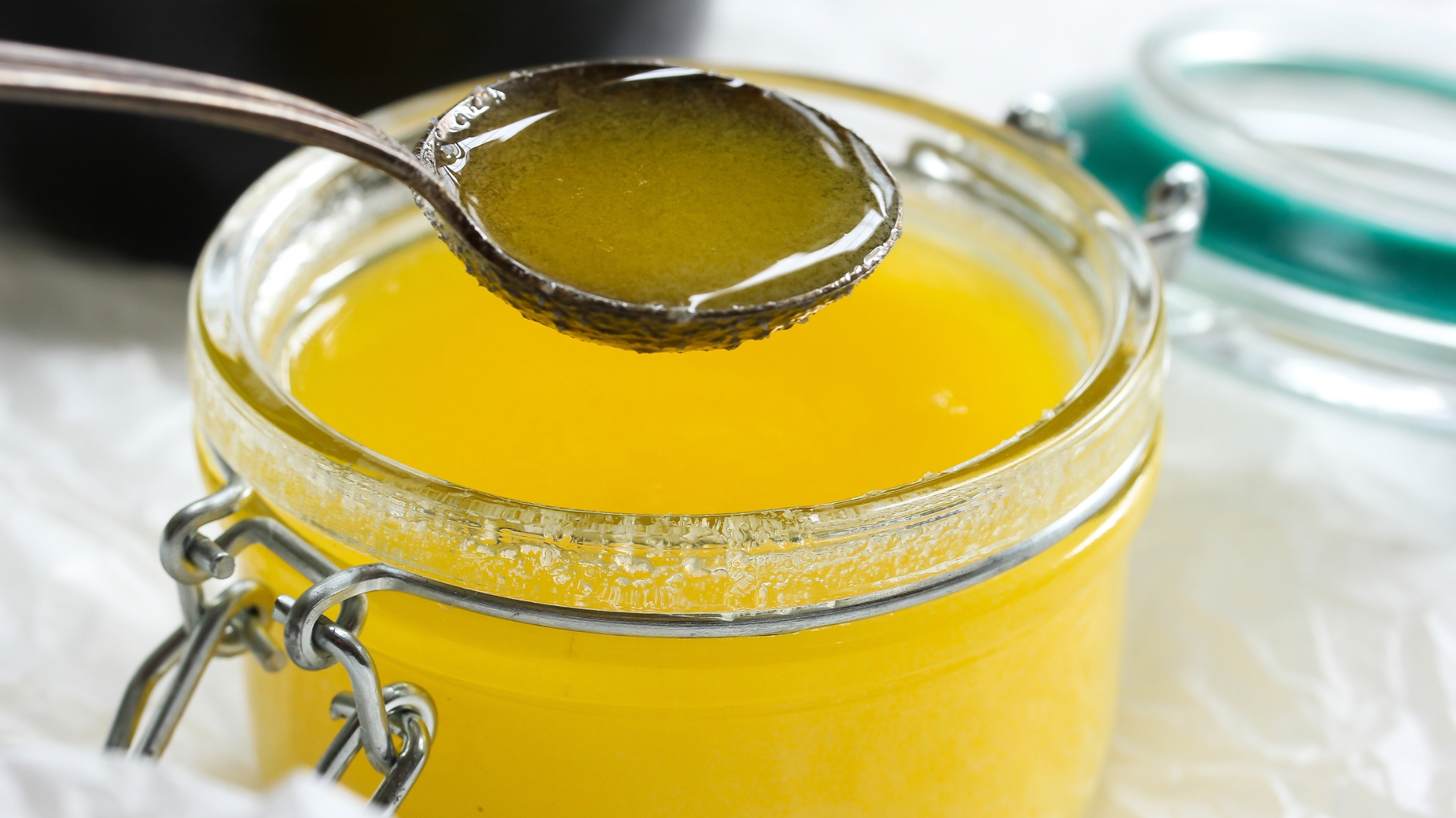In Ayurveda, an ancient Indian system of medicine, ghee holds significant therapeutic value. Known as “ghrita,” ghee is considered a vital substance for balancing the doshas—Vata, Pitta, and Kapha—fundamental energies governing the body.
Ghee is believed to pacify Vata and Pitta, promoting digestive health, enhancing absorption of nutrients, and lubricating the joints. Its unctuous nature is thought to nourish and strengthen bodily tissues, promoting longevity and vitality. Ayurvedic texts highlight ghee’s ability to enhance mental clarity, support memory, and calm the mind. Additionally, ghee is often used in Ayurvedic formulations called “anupanas,” serving as a carrier for herbs to facilitate their absorption. While moderation is emphasized, Ayurveda recognizes ghee as a therapeutic food with multifaceted benefits for holistic well-being when incorporated into a balanced and mindful lifestyle.
The best benefits can only be obtained by knowing the right ways to consume ghee.
Ghee Health Benefits
Ghee, a form of clarified butter, is believed to offer several health benefits:
- Rich in Healthy Fats: Ghee primarily contains saturated fats, including medium-chain fatty acids, which may provide a quick and efficient source of energy.
- Nutrient-Rich: It is a good source of fat-soluble vitamins like A, E, and D, supporting various bodily functions including vision, skin health, and immune function.
- Lactose-Free: Ghee’s clarification process removes milk solids, making it suitable for individuals with lactose intolerance.
- High Smoke Point: Ghee has a high smoke point, making it suitable for cooking methods like frying without producing harmful free radicals.
- Potential Anti-Inflammatory Properties: Some studies suggest that ghee may possess anti-inflammatory properties, supporting overall health.
- Ayurvedic Benefits: In Ayurveda, ghee is considered to balance the doshas, improve digestion, and promote mental clarity.
While these benefits are recognized, it’s crucial to consume ghee in moderation, especially for those watching their calorie and saturated fat intake. Hence, one should know the right ways to consume ghee for overall well-being. Individual health conditions and dietary needs should be considered, hence, consulting with a healthcare professional is also advisable.
Why Ghee is recommended for cooking over other cooking oils?
Using ghee for cooking is recommended for several reasons, making it a healthier and flavorful alternative over many cooking oils:
- High Smoke Point: Ghee has a high smoke point, higher than most vegetable oils. This means it can withstand higher cooking temperatures without breaking down or producing harmful compounds, making it suitable for various cooking methods.
- Stability: Ghee is stable at room temperature, resistant to rancidity, and has a longer shelf life compared to some oils, enhancing its usability and storage.
- Nutrient Density: Ghee is rich in fat-soluble vitamins such as A, D, and E. These vitamins play crucial roles in supporting immune function, bone health, and overall well-being.
- Lactose-Free: The clarification process removes milk solids, making ghee suitable for those who are lactose intolerant.
- Rich Flavor: Ghee imparts a distinct and rich flavor to dishes, enhancing the taste of various cuisines.
- Balanced Fats: Ghee contains a balance of saturated, monounsaturated, and polyunsaturated fats, providing a well-rounded lipid profile that is important for overall health.
- Ayurvedic Benefits: In Ayurveda, ghee is considered to balance the doshas, improve digestion, and promote mental clarity.
While ghee is calorie-dense yet it should be used in moderation, its unique properties make it a preferred choice for cooking in various culinary traditions, offering both health benefits and culinary versatility.
Benefits of Consuming Ghee on Empty Stomach
It’s important to know that individual responses to consuming ghee on an empty stomach may vary. While these traditional beliefs still exist, scientific research on these specific claims is limited. As with any dietary practice, it’s always advisable to consult with a healthcare professional before incorporating significant changes into your routine. Consuming ghee on an empty stomach is believed to be the as it offers various health benefits in certain traditional practices:
- Improved Digestion: Ghee is thought to lubricate the digestive tract, promoting smoother digestion and reducing discomfort.
- Balancing Doshas: In Ayurveda, ghee is believed to balance the doshas, particularly Vata, when consumed on an empty stomach.
- Increased Energy: Ghee is a source of healthy fats, providing a quick source of energy when consumed in the morning.
- Cognitive Benefits: Some traditional beliefs suggest that ghee consumption may enhance mental clarity and support cognitive function.
- Detoxification: In some practices, ghee is considered to have detoxifying properties that can aid in cleansing the body when taken on an empty stomach.
Right Ways to Consume Ghee for Improved Overall Wellbeing
Consuming ghee in the right way can contribute to improved overall wellbeing. Here are some recommendations:
- Moderation: While ghee offers benefits, moderation is key due to its calorie density. Limit the quantity to avoid excess calorie intake.
- Time of Consumption: Traditionally, ghee is often recommended in the morning on an empty stomach to aid digestion and provide energy. It can also be used in cooking or added to meals.
- Quality Matters: Choose high-quality, organic, or grass-fed ghee to ensure you’re getting a product free from additives or pesticides.
- Balanced Diet: Incorporate ghee into a balanced and varied diet, emphasizing whole foods, fruits, vegetables, and lean proteins.
- Mindful Cooking: Use ghee for cooking at moderate temperatures to retain its nutritional properties. Its high smoke point makes it suitable for various cooking methods.
- Personalized Approach: Individual dietary needs and health conditions vary. Consider consulting with a healthcare professional or a registered dietitian to determine the best approach for your specific situation.
- Ayurvedic Considerations: If following Ayurvedic principles, consider factors like your dosha type and the season to optimize ghee consumption for your constitution, which is one of the effective and right ways to consume ghee.
It is essential to remember, while ghee can be a part of a healthy diet, it should be integrated mindfully within the context of an overall nutritious lifestyle.

